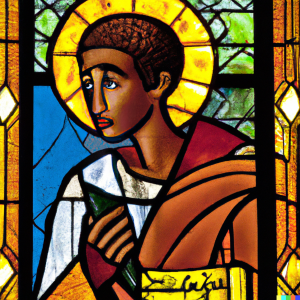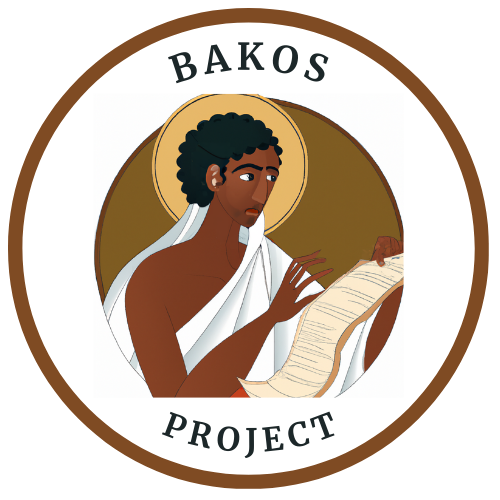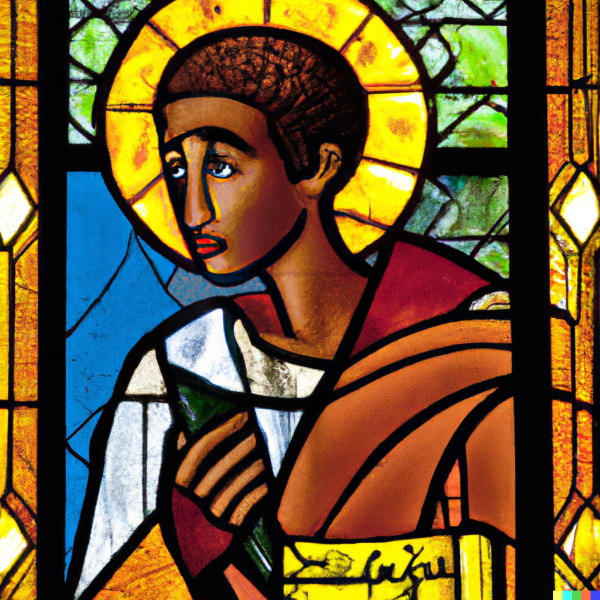One of the first references to the Ethiopian Eunuch (Acts 8:26-40) outside the Bible is from early church father Irenaeus, who wrote, “This man was also sent into the regions of Ethiopia, to preach what he had himself believed” (Against Heresies 3:12:8). According to Irenaeus, God appointed the eunuch as an evangelist to preach the gospel, teaching Ethiopians about Jesus from the Scriptures, including the book of Isaiah and other prophetic books.
To this day, he is honored by Ethiopian Christians for bringing Christianity to their part of the world. The Ethiopian Orthodox Tewahedo Church calls him Bakos (spelled ባኮስ in Amharic; also spelled Bachos). The Russian Orthodox call him Djan Darada. Recently the Episcopal Church commemorated the eunuch under the name Simeon Bachos. This latter combination of names comes from the conflation of the Ethiopian eunuch with “Simeon called Niger” (Act 13:2; NIV). But, while they were both Black, Simeon is not the same person as the eunuch.

In the book of Acts, we meet Bakos on a desert road that extends from Jerusalem down to Gaza, as he travels south to his home in north Africa. His love of God had spurred him to make the long journey to Jerusalem to worship there. As a eunuch, he was normally barred from entering “the assembly of the Lord” (Deut 23:1). This meant not only exclusion from the Temple, but also from full participation in the civic life of God’s people. Nevertheless, Bakos was not deterred and went to great lengths in his pursuit of the LORD.
Apparently in Jerusalem, Bakos purchased a scroll of Isaiah. As a treasurer in the royal court in Ethiopia, he was literate. But, as an outsider, he did not have access to a Jewish education. He had no one to explain Isaiah 53 to him, the passage he was reading on the way home. Nevertheless, Bakos was not deterred and persisted in his quest to understand the Scriptures. Possibly, he also read a few chapters ahead to Isaiah 56:3-8, where the prophetic vision gives a hopeful revelation that even the eunuch has a place with God after all.
Most likely, the remarkable appearance of Philip, the apostle, who showed up to teach Bakos, was an answer to the Ethiopian’s prayer. As he studied the text and puzzled over it, no doubt he whispered, “God, help me to understand this. I want to know you and follow you.” God heard his prayer. More than that, God revealed to Philip and Bakos that even a eunuch and gentile was to be welcomed into the assembly. When the eunuch saw a body of water, he asked Philip, “What can stand in the way of my being baptized?” (v. 36). The answer? Nothing. Nothing and no one could stand in the way of his baptism into the Body of Christ.
We don’t know Bakos’s sexual orientation or gender identity. But we do know he was a sexual minority. He was unable to conform to physical and social norms expected of males. Not only were his genitals different from other males, having been castrated, but the procedure likely occurred prior to puberty, impacting the hormones in his body. Deprived of testosterone, he did not go through puberty to develop secondary sex characteristics. Socially, he was unable to conform to certain familial and procreative expectations that Jewish and Greco-Roman society normally placed on men. In other words, Bakos looked and sounded different from other men and could not perform socially or sexually in the same way as other men. The castration (without anesthesia) would have been traumatic for any child and had a lasting impact on his life.
But despite his difference—or more likely because of it—Bakos sought after God. He traveled long distances to worship, studied the Scriptures intensely, and was baptized following a confession of faith. He was one of the first gentile converts to Christianity and was chosen by God to reach the people of Ethiopia. Bakos is an example of how God welcomes sexual and gender minorities into the Body of Christ. Not only that, but also the life of Bakos reveals that God calls the “eunuchs” of this world to serve as leaders in the Church.
Note: I have chosen the spelling “Bakos” based on an academic paper by an Ethiopian author who states, “As Ethiopian exegetic scholars suggest, the proper name of the Ethiopian eunuch is traditionally known as Melchizedek or Bakos” (Andualem Dagmawi Gobena, “Mariology in Soteriology,” [St. Michael’s College, 2006], 2, fn 3). In recent years, the name “Simeon Bachos” was edited into Irenaeus’s quote concerning the eunuch, leading to the common erroneous assumption that Irenaeus called the eunuch by that name; he did not. The name Bakos has an Ethiopian Christian origin.

